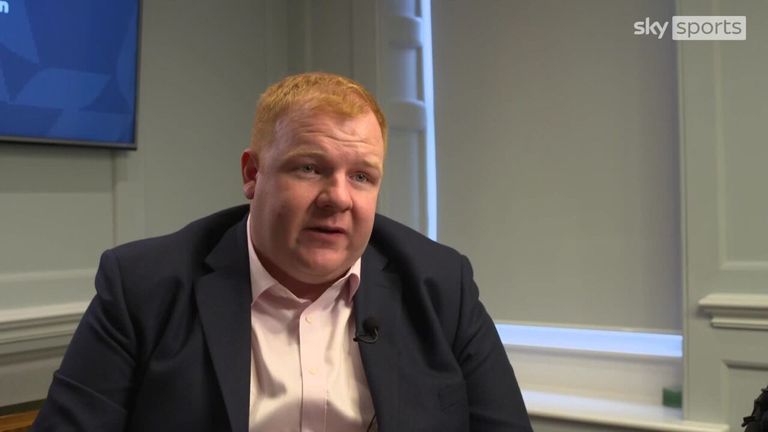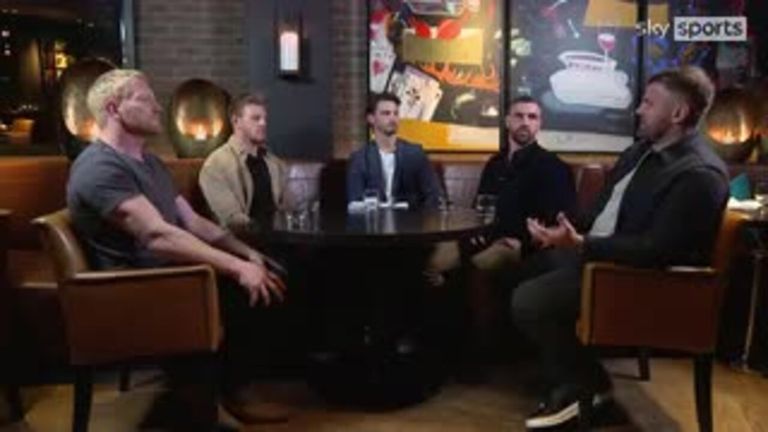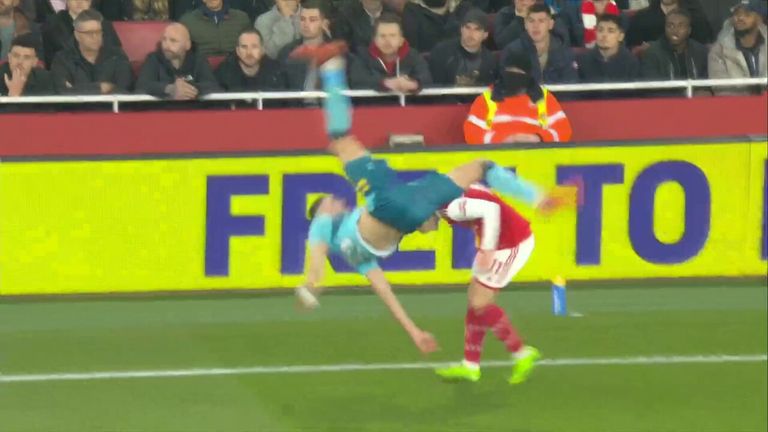Concussion in football: Link between sporting head impacts and CTE ‘reasonable to consider’, says report
[ad_1]
A key document which shapes sport policy on concussion says it is “reasonable to consider” there is a potential association between repetitive head impacts and the development of chronic traumatic encephalopathy.
It was announced last month that three more former Football League players – Jimmy Conway, Jim Fryatt and Jimmy Gabriel – had been posthumously diagnosed as having CTE, a progressive and fatal brain disease.
The findings almost doubled the number of publicly confirmed diagnoses within English football, following cases involving Jeff Astle, Rod Taylor, Billy McEwan and Nobby Stiles.
Now, the latest Consensus Statement on Concussion in Sport, a document which in the past has played a key part in shaping how sports governing bodies set their concussion policies and protocols, states: “It is reasonable to consider extensive exposure to repetitive head impacts, such as that experienced by some professional athletes, as potentially associated with the development of the specific neuropathology described as CTE-NC (CTE neuropathologic change).”
Sports such as football and rugby have made changes in recent years to provide greater protection against the risk of concussive and sub-concussive impact, for example restrictions on heading in training at all levels of football and trials to lower the tackle height in rugby.
The new Statement says studies conducted to date on the effects of concussion and repetitive head impacts on the health of athletes in later life have been “limited”.
The 2019 FIELD Study found professional footballers were three and a half times more likely to die from neurodegenerative disease than age-matched members of the general population, raising concerns that their greater exposure to concussive and sub-concussive impacts was behind the heightened risk.
However, the Statement – the first to be published since 2017 – says much more work is required to firmly establish any link.
“The studies, to date, are methodologically limited because most were not able to examine, or adjust for, many factors that can be associated with the neurological outcomes of interest,” it read.
“The studies examining cognitive impairment and neurological outcomes did not examine genetic factors and usually did not consider or control for factors known to be important for brain health in the general population, such as educational attainment, socio-economic status, smoking, hypertension and cardiovascular disease, diabetes, sleep apnea, white matter hyperintensities, social isolation, diet, physical activity or exercise.
“To establish a clear causal association between sports participation early in life and cognitive impairment or dementia late in life or to quantify that association, future well-designed case-control and cohort studies, that include as many individual risk-modifying and confounding factors as possible, are needed.”
The Statement recommended the creation of a new working group, which would seek funding for further research on the possible long-term impacts of brain injuries and “continue deliberations on these topics in the interest of athlete care”.
In a briefing related to the publication of the report, Statement joint first author Dr Jon Patricios said football must operate a “low threshold” for suspected concussion if it wishes to continue with short, on-field assessments.
Head injury campaigners, world players’ union FIFPRO, the Premier League and Major League Soccer in the United States called for a trial of temporary concussion substitutes earlier this year, which would allow for a 10-minute off-field assessment for a player suspected of concussion.
The game’s law-making body, the International Football Association Board, rejected that proposal in January with work continuing on the existing additional permanent concussion substitute trial, which includes a much shorter on-field assessment.
Dr Patricios said: “Three minutes is sufficient to suspect a concussion (but) if you’re only allowing a three-minute period, your threshold for removing that player should be very low.
“If there is a suspicion (they have suffered a concussion) they should be taken off and not return to play if there isn’t adequate time to do a proper evaluation.”
Dr Patricios, as part of the Concussion In Sport Group which co-ordinates the Consensus Statement, wrote to the IFAB in February in support of the calls for a temporary concussion substitute trial.
Work on this latest Statement began in 2018, and is based on outcomes discussed by more than 100 expert clinicians at the Conference on Concussion in Sport held in Amsterdam last October.
The Conference is funded and organised by sports bodies including FIFA, World Rugby and the International Olympic Committee.
The work of the CISG has faced criticism in the past from some head injury campaigners for being too protective of sports organisations, but the joint first author of the Statement, Dr Kathryn Schneider, says that the group has “evolved the process and been inclusive” in the creation of this latest document, published in the British Journal of Sports Medicine.
Elsewhere in the Statement, clinicians are encouraged to recommend early return to light physical activity that will not exacerbate symptoms within the first 24 to 48 hours of suffering a concussion, finding that strict rest until the complete resolution of concussion-related symptoms is “not beneficial”.
Limited screen-time in the first 48 hours after injury can also aid recovery, according to data examined by the clinicians who prepared the Statement.
[ad_2]
Source link






